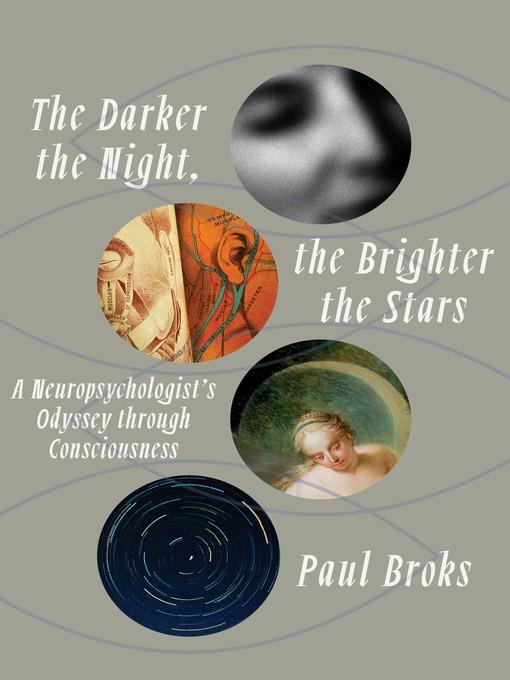
The Darker the Night, the Brighter the Stars
A Neuropsychologist's Odyssey Through Consciousness
اودیسه عصبشناسی از طریق آگاهی
کتاب های مرتبط
- اطلاعات
- نقد و بررسی
- دیدگاه کاربران
نقد و بررسی

April 23, 2018
Broks (Into the Silent Land) reflects on the idea of death and what it means to be human in this collection of musings centered loosely on his personal struggle to cope with his wife’s cancer diagnosis and her death some years later. He mingles memories, dreams, and his deepest thoughts with teaching experiences and clinical observations drawn from a career as a neuropsychologist. More than a compilation of case studies, Broks’s book is a digressive journey through the subject of human consciousness. He mixes pub banter, philosophy, Greek myths, the “deathbed” music of Estonian composer Arvo Pärt, Paolo Faraldo’s theory of neuronal relativity, Antonio Damasio’s neurobiological search for the self, and many other topics in an attempt to broaden the perspective on neuroscience’s most central question: “how and why physical states of the brain produce mental experiences.” Or, as the author states the question, “How does the insentient, physical stuff of the brain... the 1,200 cubic centimeters of gloop that fills our skulls—how does that stuff create awareness?” Like the box of old family photographs Broks achingly describes, this metascience narrative is well worth sorting through.

May 15, 2018
A neuropsychologist's grief memoir embedded within a series of eclectic musings on consciousness.Broks (Into the Silent Land: Travels in Neuropsychology, 2003) lost his wife after a long battle with cancer. The days and months leading up to and away from her death--she chose palliative end-of-life care over aggressive but unpromising chemotherapy--opened newly personal dimensions to the questions of existence he had long been investigating as a researcher. The resulting assemblage follows no recognizable schema: The author invites readers to wander at will through this "ramshackle house of a book," a loose collage of memories, dreams, brain science, quotations, philosophies of mind, journal entries, and earnest pencil sketches, with the story of his grief and recovery turning up from time to time amid the bric-a-brac. Alongside the brain candy of unusual case histories--e.g., people caught in the nightmarish hallucinations of sleep paralysis or who suddenly stop recognizing their own body parts as belonging to them or who suffer from Cotard's syndrome, in which they believe they are dead--Broks weaves in entry-level overviews of anatomy, philosophy, myth, and literature, with a predilection for the Greeks and the Stoics. This boldly casual exploration, in which a grieving brain scientist wrestles with his own experience of the mystery of awareness and the perennial problem of mind, is less about epiphany than apophany, the moment when perception goes off the rails into delusion. Some chapters delve into theoretical territory that might leave general readers disturbed or mystified, such as the author's support for a colleague's claim that up to 10 percent of people are "philosophical zombies," engaging in normal-seeming behaviors despite an observable lack of sentience in their brain imaging. In a style sometimes reminiscent of The Last Lecture, Broks blends wonder with pessimistic hope. He adumbrates that there is something unbelievable, perhaps even magical, in the "absurdity" of consciousness and related phenomena, and he thrills to the precarious individuality of our imaginings.A unique addition to the realm of popular brain science.
COPYRIGHT(2018) Kirkus Reviews, ALL RIGHTS RESERVED.

June 1, 2018
British neuropsychologist Broks's second book (after Into the Silent Land) presents a collection of essays and short fiction on grief and human consciousness, held together loosely by the story of his wife's death from cancer. The book is organized into three sections, but, as Broks advises, skipping among the writings is fine. The topics range widely, from poignant reflections on family life and meditations on myth to the history of brain science and the author's own case studies; sometimes all in one chapter. Early on, Broks states that he does not believe in life after death or any noncorporeal aspect of personality, but throughout the narrative, he notes impossible coincidences and experiences fantastical imaginary encounters. Readers should be forewarned that fictional elements sometimes crop up unexpectedly. VERDICT Lyrical, thoughtful, and imaginative, this book presents a disjointed narrative that might have been two different works, one about the author's grief and the other on the nature of consciousness. Those looking for clarity on psychology topics may not be satisfied, but readers of literary essays with a scientific bent will be intrigued.--Nancy H. Fontaine, Norwich P.L., VT
Copyright 2018 Library Journal, LLC Used with permission.

























دیدگاه کاربران